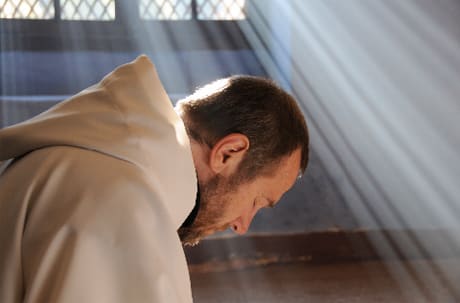Sure to be described as slow by some and contemplative by others, Xavier Beauvois's uniquely powerful Of Gods and Men continues his trend of making movies that juxtapose violence and injustice with questions of an existential nature. In truth, this film is closer to a masterpiece than his previous, more accessible, entries, showing restraint and austerity in the face of overwhelming emotional realities. This decision brings much-needed dignity to what unfolds, given that this is indeed based on the true story of the martyred Trappist Cistercian monks, whose message of peace was challenged by extremist Muslim fundamentalists in 1996 Tibhirine, Algiers.
Rather than diving into the specifics of the conflict, Beauvois keeps the action inside the monastery, save some quick inserts of violence early on to contextualize the external threat. He's more interested in examining just why it is that Christian de Cherge (Lambert Wilson) and his fellow men of the cloth chose to stay in Algiers, despite receiving their first threatening visit from armed Islamic militants hoping to impose Sharia law as early as 1993.
While much of the film takes its time to examine the customs of these men, from chants to daily chores to dinnertime rituals, each of their characters takes shape with both individuality and a connecting spirit, revisiting their original decision to live life such as they do. Each man has his flaws (i.e., the inability to listen or a tendency to patronize), which is key in making this a convincing tale of spiritual purpose, mainly because the audience identifies with people they can understand beyond just being good.
Since the nature of this story is to capture the humanity in even the most mundane of moments, it can be trying. When the monks chant for the tenth or 11th time, you might even be tempted to abandon the film altogether. But there are some astounding moments, such as one where the men – aware of their fate – listen to Swan Lake and enjoy a glass of wine, which dig down to the core of one's beliefs, and the hope for good, in a world conflicted by arbitrary rightness.
(Mongrel Media)Rather than diving into the specifics of the conflict, Beauvois keeps the action inside the monastery, save some quick inserts of violence early on to contextualize the external threat. He's more interested in examining just why it is that Christian de Cherge (Lambert Wilson) and his fellow men of the cloth chose to stay in Algiers, despite receiving their first threatening visit from armed Islamic militants hoping to impose Sharia law as early as 1993.
While much of the film takes its time to examine the customs of these men, from chants to daily chores to dinnertime rituals, each of their characters takes shape with both individuality and a connecting spirit, revisiting their original decision to live life such as they do. Each man has his flaws (i.e., the inability to listen or a tendency to patronize), which is key in making this a convincing tale of spiritual purpose, mainly because the audience identifies with people they can understand beyond just being good.
Since the nature of this story is to capture the humanity in even the most mundane of moments, it can be trying. When the monks chant for the tenth or 11th time, you might even be tempted to abandon the film altogether. But there are some astounding moments, such as one where the men – aware of their fate – listen to Swan Lake and enjoy a glass of wine, which dig down to the core of one's beliefs, and the hope for good, in a world conflicted by arbitrary rightness.
